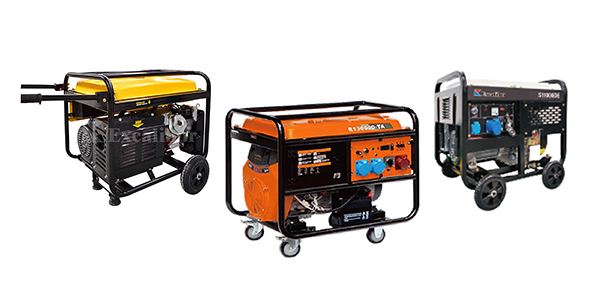In today’s energy market, there are many types of energy equipment. Among these options, diesel generators have long been a dependable choice for providing backup power and even serving as primary power sources in remote areas. However, with advances in technology and growing environmental concerns, alternative power sources such as solar, wind, and natural gas generators are gaining traction. This article delves into the cost analysis of diesel generators compared to these alternative power sources, evaluating both initial investment and long-term operational costs.
Initial Investment Costs
Diesel Generators
The initial cost of a diesel generator varies based on its size and capacity. For small residential units, prices typically range from $3,000 to $15,000. Larger commercial units can cost anywhere from $20,000 to $100,000 or more. These costs cover the generator itself, installation, and any necessary peripherals such as transfer switches and fuel storage tanks.
Solar Power Systems
Over the past ten years, solar power system costs have dropped dramatically. A typical residential solar setup can range from $10,000 to $30,000, including panels, inverters, mounting systems, and installation. For commercial setups, costs can escalate to $100,000 or more, depending on the scale and energy requirements. On the other hand, solar power systems frequently qualify for tax breaks and government incentives, which can significantly reduce the initial cost.
Wind Turbines
Small wind turbines suitable for residential use can cost between $10,000 and $70,000, depending on the size and capacity. Commercial-scale wind turbines are significantly more expensive, often ranging from $1.3 million to $2.2 million per megawatt of capacity. Installation, grid connection, and maintenance infrastructure add to the initial expenditure.
Natural Gas Generators
Natural gas generators offer a competitive initial cost structure, with residential units priced between $2,000 and $6,000. Larger commercial generators can cost from $10,000 to $30,000. Installation costs are generally lower than those for diesel generators, as natural gas is often readily available through existing utility lines.
Fuel and Operational Costs
Diesel Generators
Diesel fuel costs can be volatile, but on average, diesel fuel prices hover around $3 to $4 per gallon. Diesel generators are known for their efficiency, consuming between 0.4 to 0.6 gallons per hour per kilowatt of power produced. Maintenance costs, including regular oil changes, filter replacements, and engine overhauls, can add up to approximately $0.03 to $0.05 per kilowatt-hour (kWh) of electricity produced.
Solar Power Systems
Once installed, solar power systems have minimal operational costs. Sunlight is free, and maintenance typically involves periodic cleaning of panels and occasional inverter replacements, which may cost around $0.01 to $0.02 per kWh over the system’s lifetime. Battery storage systems, if used, can add to the cost but are decreasing in price as technology advances.
Wind Turbines
Operational costs for wind turbines are relatively low, with maintenance averaging about 1% to 3% of the initial turbine cost per year. Wind is a free fuel source, although turbines need to be inspected frequently and repaired on occasion. Overall, the operational cost is estimated at $0.01 to $0.02 per kWh.
Natural Gas Generators
Prices for natural gas, which average between $1 and $2 per therm (100 cubic feet), are typically less than those for diesel and more consistent. Natural gas generators consume about 7 to 10 cubic feet of gas per kilowatt-hour produced. Maintenance costs are similar to those of diesel generators, around $0.02 to $0.03 per kWh, making them a cost-effective alternative.
Environmental Impact and Regulations

Diesel Generators
Diesel generators are known for their robust performance but are also significant contributors to greenhouse gas emissions and particulate matter. Regulatory compliance can be stringent, especially in urban areas where air quality standards are high. Diesel generators must often be equipped with exhaust after-treatment systems to reduce emissions, adding to both initial and operational costs.
Solar Power Systems
Among the cleanest energy sources available, solar power generates no direct emissions when in use. The largest environmental impacts come primarily from the manufacture and disposal of solar panels and cells. However, technological advancements are continuously reducing these impacts. Regulatory incentives support solar installations, making them an appealing option both environmentally and economically.
Wind Turbines
The primary concerns involve the production and disposal of turbine components and the potential effects on local wildlife, particularly birds and bats.
However, the major advantages of lower greenhouse gas emissions usually outweigh these effects. Wind projects often receive favorable regulatory support, including subsidies and tax incentives.
Natural Gas Generators
Because it produces fewer carbon dioxide and particulate matter emissions than diesel, natural gas is thought to be a cleaner fossil fuel. It nevertheless continues to be a producer of greenhouse gases, especially methane.
Regulatory frameworks are generally more favorable towards natural gas, given its lower emissions profile. This can result in lower compliance costs compared to diesel generators.
Reliability and Performance
Diesel Generators
Diesel generators can run continuously for a long time and are the best partner for emergency backup and remote areas. However, their performance can be affected by fuel quality and storage conditions.
Solar Power Systems
Solar power systems are highly reliable, especially in sunny climates. The weather has an impact on their effectiveness, and energy output might fluctuate at night and on overcast days. Battery storage systems can mitigate this issue, ensuring a steady power supply.
Wind Turbines
Wind turbines offer reliable power generation in windy areas. Their performance is site-specific, and they are most effective in locations with consistent wind patterns. Energy storage solutions can mitigate the variability in power generation.
Natural Gas Generators
Natural gas generators provide reliable and consistent power, with the advantage of fuel availability through utility lines. They are suitable for both backup and primary power supply, with less environmental impact than diesel generators.
Conclusion
When conducting a cost analysis of diesel generators versus alternative power sources, several factors must be considered. Diesel generators offer reliability and durability but come with higher fuel costs and environmental impacts. Solar and wind power systems have higher initial costs but benefit from minimal operational expenses and significant environmental advantages. Natural gas generators provide a balance between initial and operational costs, with a cleaner emissions profile than diesel.
The selection of a power source will ultimately be based on particular requirements, such as financial constraints, environmental factors, and dependability standards. By carefully weighing these factors, businesses and homeowners can make informed decisions that align with their energy goals and financial constraints.




